How Much Does Sand Casting Cost?
Sand casting, a widely used manufacturing process, offers an economical solution for producing complex metal parts. Understanding the cost factors associated with sand casting is essential for businesses and individuals considering this method for their projects. The total cost of sand casting is influenced by several variables, from material choices and tooling to production volume and finishing processes.
Material Costs
The primary materials used in sand casting include sand, metal, and casting additives. The cost of high-quality sand can vary depending on its purity and grain size. For instance, silica sand is commonly employed due to its favorable properties but may be subject to fluctuations in market price. Additionally, the metal used for casting, such as aluminum, iron, or brass, plays a significant role in the overall cost. The prices of metals can fluctuate based on global demand and supply, thus affecting the final cost of the finished product.
Tooling Costs
Tooling is another critical factor in the cost of sand casting. The creation of molds typically involves designing patterns that correspond to the desired product shape. Patterns can be made from wood, metal, or plastic, each introducing different costs. Additionally, specialized tooling may be required for complex designs, increasing the upfront investment. While sand casting allows for a relatively low tooling cost compared to other methods like injection molding, intricate designs may still require a significant investment upfront.
Production Volume
Production volume directly impacts the unit cost of sand casting. For small production runs, the per-piece cost tends to be higher due to the fixed costs associated with tooling and setup. Conversely, as production volume increases, these costs are spread across a larger number of units, reducing the unit price. Thus, businesses must evaluate their specific needs and production goals to determine the most economical approach.
how much does sand casting cost

Labor Costs
Labor costs are another important consideration. Sand casting requires skilled workers for tasks such as designing patterns, mixing sand, pouring metal, and finishing the castings. The labor rate can vary significantly depending on the region and the skill level of the workforce. Automation in the casting process may reduce labor costs, but the initial investment in equipment can be substantial.
Finishing Processes
After casting, many products require finishing processes like machining, welding, or surface treatment to achieve the desired specifications. The complexity and extent of these finishing processes will add to the overall cost. It's vital to factor in these additional expenses when budgeting for a sand casting project.
Additional Factors
Other elements that may influence the cost of sand casting include quality control measures, environmental regulations, and logistical costs related to shipping finished products. Quality control is crucial to ensure that the final product meets the required specifications, which may involve testing and inspection costs. Similarly, compliance with environmental regulations may require additional resources, impacting the total cost.
Conclusion
In summary, the cost of sand casting is not a fixed number but rather a combination of multiple factors, including material selection, tooling and production volume, labor, finishing processes, and additional operational costs. For those considering the sand casting process, a thorough analysis of these variables is necessary to develop an accurate budget and determine the feasibility of the project. By understanding the associated costs, businesses can make informed decisions and leverage the advantages of sand casting as a cost-effective manufacturing method.
Post time:12 月 . 03, 2024 18:21
Next:foundry sand contamination
